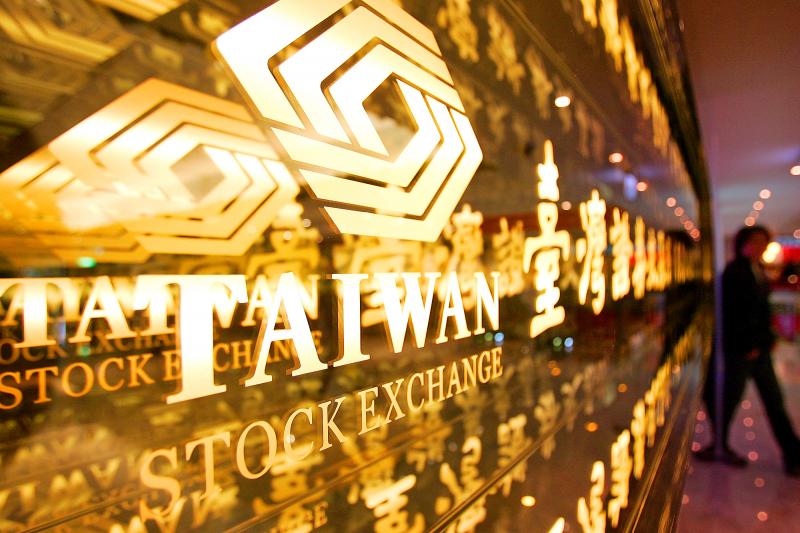The aggregate revenue of companies listed on the Taiwan Stock Exchange (TWSE) grew at a much slower pace last month, as financial companies’ investments were affected by the Russia-Ukraine war and optoelectronics companies saw falling demand, the exchange’s data showed.
The combined revenue of the 963 TWSE-listed firms edged up 1.66 percent from a year earlier to NT$3.11 trillion (US$104.7 billion), after growing 14 percent in March, the data showed.
The TWSE said that 507 companies, or 52.6 percent, reported revenue growth, while 456 companies posted declines.

Photo: Maurice Tsai, Bloomberg
The financial sector saw revenue fall by NT$52.8 billion, or 23.61 percent, annually to NT$170.8 billion last month, affected by market volatility and the Russia-Ukraine war, the exchange said.
It was the fourth consecutive month that the financial sector posted a decline, but last month’s fall narrowed from March’s NT$103.3 billion, it said.
For the first four months of the year, the financial sector’s revenue decreased by NT$156.1 billion, or 16 percent, to NT$799.8 billion, TWSE data showed.
The optoelectronics sector reported the largest fall in revenue last month, down 24.06 percent year-on-year to NT$94.7 billion, as flat-panel prices dropped and demand weakened, the exchange said.
LCD panelmakers Innolux Corp (群創) and AU Optronics Corp (AUO, 友達光電) reported that revenue declined 13.8 percent and 31 percent respectively last month, while smartphone camera lens maker Largan Precision Co (大立光) saw revenue contract 7.6 percent, companies’ data showed.
For the first four months, the optoelectronics sector reported that cumulative revenue dipped 8 percent to NT$434.7 billion, TWSE data showed.
The shipping sector’s revenue continued to rise last month on the back of higher freight rates, with sales advancing 60 percent to NT$158.5 billion, the exchange said.
The sector’s cumulative revenue in the first four months expanded 68 percent to NT$639.1 billion, it said.
The semiconductor sector, as well as the oil, gas and electricity sector, also continued to post strong revenue growth last month, the exchange said.
From January to last month, TWSE-listed firms’ aggregate revenue rose 9.89 percent from a year earlier to NT$12.9 trillion, TWSE data showed.

NEW IDENTITY: Known for its software, India has expanded into hardware, with its semiconductor industry growing from US$38bn in 2023 to US$45bn to US$50bn India on Saturday inaugurated its first semiconductor assembly and test facility, a milestone in the government’s push to reduce dependence on foreign chipmakers and stake a claim in a sector dominated by China. Indian Prime Minister Narendra Modi opened US firm Micron Technology Inc’s semiconductor assembly, test and packaging unit in his home state of Gujarat, hailing the “dawn of a new era” for India’s technology ambitions. “When young Indians look back in the future, they will see this decade as the turning point in our tech future,” Modi told the event, which was broadcast on his YouTube channel. The plant would convert

‘SEISMIC SHIFT’: The researcher forecast there would be about 1.1 billion mobile shipments this year, down from 1.26 billion the prior year and erasing years of gains The global smartphone market is expected to contract 12.9 percent this year due to the unprecedented memorychip shortage, marking “a crisis like no other,” researcher International Data Corp (IDC) said. The new forecast, a dramatic revision down from earlier estimates, gives the latest accounting of the ongoing memory crunch that is affecting every corner of the electronics industry. The demand for advanced memory to power artificial intelligence (AI) tasks has drained global supply until well into next year and jeopardizes the business model of many smartphone makers. IDC forecast about 1.1 billion mobile shipments this year, down from 1.26 billion the prior

People stand in a Pokemon store in Tokyo on Thursday. One of the world highest-grossing franchises is celebrated its 30th anniversary yesterday.

Zimbabwe’s ban on raw lithium exports is forcing Chinese miners to rethink their strategy, speeding up plans to process the metal locally instead of shipping it to China’s vast rechargeable battery industry. The country is Africa’s largest lithium producer and has one of the world’s largest reserves, according to the US Geological Survey (USGS). Zimbabwe already banned the export of lithium ore in 2022 and last year announced it would halt exports of lithium concentrates from January next year. However, on Wednesday it imposed the ban with immediate effect, leaving unclear what the lithium mining sector would do in the